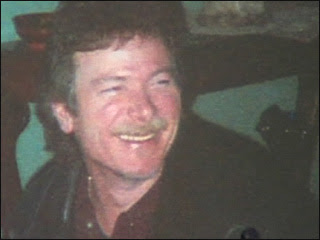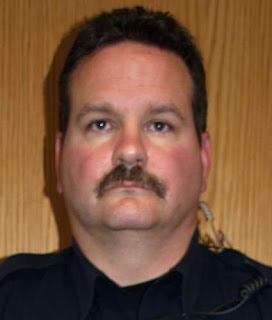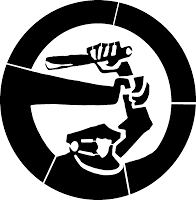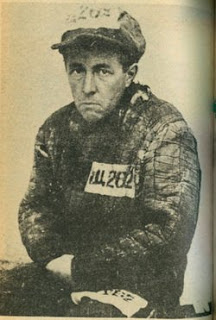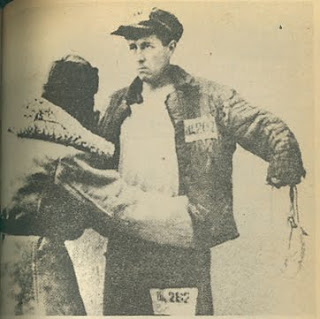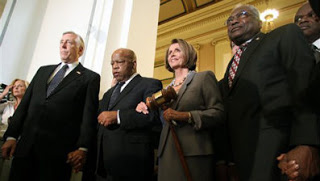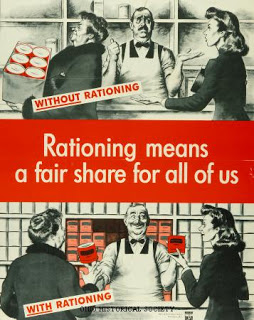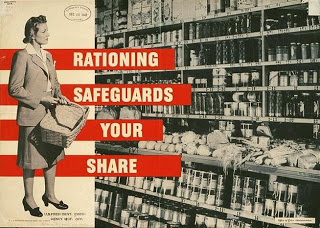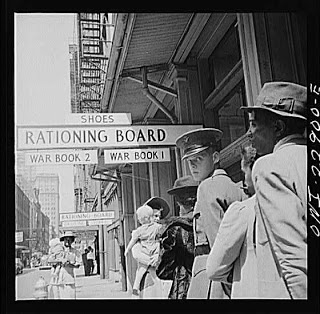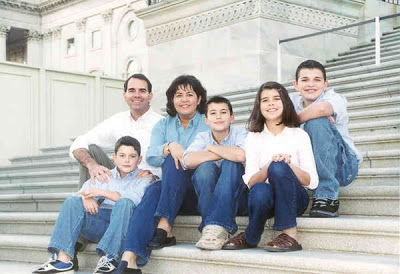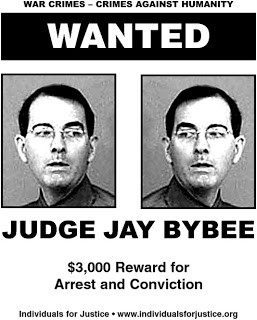
Crackdown: State troopers seal off a road as the Feds conduct a tri-state operation to arrest members of the Hutaree "Christian militia."
The first thing that must be understood is that while the murder of any human being is the most serious crime one can commit, it is not necessarily a crime to kill a police officer.
Defensive use of lethal force against criminal aggression is morally legitimate and legally protected, even -- no, make that "especially" -- when the aggressor is clothed in the habiliments of the state's punitive priesthood. This is not the view of some obscure, unsavory self-styled Christian militia group from Michigan. It is the long-established view of the United States Supreme Court as expressed more than a century ago in the ruling John Bad Elk v. The United States.
John Bad Elk, a Lakota Indian living on a South Dakota reservation, shot and killed a tribal policeman named John Kills Back, who attempted to carry out an arrest without warrant or probable cause. Bad Elk was convicted of murder after the Judge instructed the jury (as paraphrased by the High Court) that "the policeman had the right to arrest [Black Elk] ... and to use such force as was necessary to accomplish the arrest, and that [Black Elk] had no right to resist it."
Under the common law, the High Court pointed out, Black Elk was not obliged to submit to an unlawful arrest, and he "had the right to use such force as was absolutely necessary to resist an attempted illegal arrest...." Furthermore, ruled the Court, "the law looks with very different eyes upon the transaction when the officer had the right to make the arrest from what it does if the officer had no such right. What might be murder in the first case might be nothing more than manslaughter in the other, or the facts might show that no offense had been committed." (Emphasis added.)
Simply put: As a matter of law, a citizen has an unqualified right to use lethal force to defend himself against a criminal assault by a law enforcement officer. This is not "sedition"; it's stare decisis.
The federal indictment against the Hutaree "Christian militia" describes the group's alleged preparations for potential armed conflict against law enforcement officers as a "seditious conspiracy." Whether this constitutes a criminal conspiracy of any kind depends entirely on whether the group planned to commit aggressive violence against individuals.
If they were acquiring weapons and developing appropriate skills in anticipation of defending themselves against government aggression, their actions-- while possibly conspiratorial in nature -- don't amount to a crime. This is particularly true in light of our cultural history, in which sedition -- agitation to change the existing political order -- is our proudest civic tradition.
Government is nothing more than the rationalization and exercise of violence. Everything done by government contains at least the implicit threat of lethal coercion. Thus the indictment's description of Hutaree as "an anti-government extremist organization which advocates violence against local, state and Federal law enforcement" is a product of rhetorical onanism.
The same is true of the charge that the militia's members "did knowingly conspire, confederate, and agree with each other and other persons known and unknown" -- great googlymoogly, do federal prosecutors pay their scribes by the syllable? -- "to levy war against the United States, to oppose by force the authority of the Government of the United States, and to prevent, hinder, and delay by force the execution of any United States law."
If Hutaree was preparing for armed defense against criminal actions by government officials, this charge is as pointless as a broken pencil. If their efforts to "prevent, hinder, and delay" various government initiatives were confined to activism, rather than armed conflict, they are -- in that particular -- not substantively different from hundreds or thousands of other groups.
Once again, the gravamen here is the question of aggressive violence. As paraphrased by the Regime's media stenographers, the charges against Hutaree are digested into a "plot to kill law enforcement officers." This would allegedly entail murdering one policeman and then ambushing others who would attend the Soviet-style paramilitary ritual that occurs on those rare occasions a police officer is killed in the line of duty.
Rather than providing specific details, referring to particular witnesses, or alluding to other material evidence, the indictment repeatedly refers to Hutaree's "general concept of operations." To whose "concept" does this refer -- the specific, overtly stated intentions of the militia members, or the way those intentions were conceived by federal authorities or their allied left-wing "watchdog" activists? Was this "concept of operations" committed to print, or captured on an audio or video record? Was there a specific plan, or were there outbursts of ill-considered speculation or depraved wishful thinking?
In studiously vague language, the federal indictment alleges that "one officer in particular" had been identified as a potential murder target. Plotting to murder another human being is a crime, of course, as is preparing to murder others who would assemble for a funeral.
These matters are questions of fact dependent on evidence not outlined in the indictment. Given that cases of this kind often end in plea bargains before they go to trial, it's possible we may never learn what, if any, evidence supports the most serious charges against the group.

Hutaree, we are told, is a violent cult. FBI Special Agent Andrew Arena referred to Hutaree as typical of the "radical and extremist fringe groups that can be found throughout our society." It may well be a dangerous little sect; like nearly everyone else, I hadn't heard of the group prior to yesterday (March 28), so I can't offer an adequately informed opinion of its intentions. At least some of those involved in other citizen militia groups in Michigan were leery of Hutaree, suspecting that it was seeking to provoke a civil war.
Whatever is eventually learned about Hutaree, as things presently stand the indictment against it could provide a template for "seditious conspiracy" prosecutions involving practically any group that endorses the use of defensive force to protect citizens against government aggression.
Indeed, the definition of "conspiracy" used in the Hutaree indictment could make a criminal out of anyone who reads Federalist Paper 46 in public, thereby sharing James Madison's commendably seditious admonition that the people preserve "the advantage of being armed" in the event that insurrection against the central government proves necessary in order to preserve liberty.
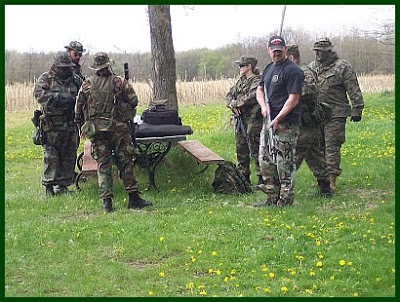
The tri-state crack-down against Hutaree, which involved what was described as a "batallion" of state, local, and federal troops (there's little point in using the term "police" any more), is the largest but by no means only recent campaign of its kind.
Last week the Feds reeled in several members of a properly ignominious Connecticut neo-Nazi street gang calling itself the White Wolves.
The White Wolves crackdown followed the familiar outline:
A federal informant (in this case, a convicted felon acting as a "cooperating witness") infiltrates a tiny and all but inconsequential clique of petty criminals, incites them to commit an "overt" criminal act (in this case by asking them to sell him firearms). The feds then draw up a grandiose indictment depicting that the little knot of skinheads as a world-historic menace.
As is true of the case against the Hutaree militia, the White Wolves indictment is a bureaucratic confection -- a wedding cake-sized pile of rhetorical meringue concealing a criminal complaint the size of a small Twinkie.
The objective here -- and, most likely in the Feds' prosecution of the Hutaree militia -- is to induce at least one or more members of the targeted group to join the pool of infiltrator/provocateus for use against other targeted groups.
The dynamics of this routine are a bit like multi-level marketing: The federal handler -- usually an FBI Special Agent assigned to a Joint Terrorism Task Force -- serves as the "upline" to a small stable of provocateurs, each of which is highly motivated to create a large "downline" of similarly compromised assets. As with many other MLMs, nothing of value is actually accomplished, but the people at the top of the pyramid -- in this case, the Homeland Security bureaucrats -- make a very comfortable living.
In times of relative tranquility, that cynical exercise provides career security for Homeland Security functionaries. There's reason to believe that the Feds have expanded and escalated this ongoing enterprise to exploit, and exacerbate, growing public hostility toward an increasingly invasive and esurient government.
Whether it is ever demonstrated that Hutaree intended to "levy war" against the U.S. government, this much is beyond serious dispute: The Homeland Security state is unambiguously preparing for war with the public -- in fact, it has been doing so for a long time.
During a 1997 visit to the Battle Command Training Program at Ft. Leavenworth, author Robert Kaplan frequently heard "discussion of the Posse Comitatus Act, which forbids the National Guard to act as a local police force once it has been federalized by the army in a civil emergency," he recalled in his book An Empire Wilderness. "The implication was that turbulence within the United States might one day require the act to be repealed."
Kaplan describes a round-table discussion of potential military action against domestic dissident groups. One Marine Major, referring to the Oklahoma City Bombing (an atrocity carried out by a former federal employee and "others" who remain "unknown"), declared: "The minute I heard about Oklahoma City, I knew who did it -- rednecks, the kind of guys from southern Idaho."
According to Kaplan, that officer and another of the same rank "suggested that `a time might come when the military will have to go domestic.'"
In the strictest sense, that was a treasonable utterance -- a threat, by people in a position with the means to carry it into effect, to wage war against the people of the "united States in Congress assembled."
When talk of that kind is indulged in by members of a tiny, disreputable club, it is labeled "seditious conspiracy" involving "weapons of mass destruction" -- that is, homemade explosives. When such talk reflects the shared opinion of armed functionaries of the Regime -- people with access to the largest and most destructive arsenal ever assembled, and a growing foreign body count demonstrating a willingness to use it -- this is a sober, responsible discussion of Homeland Security affairs.
Apparently, it's sound public policy for the government to wage war against the citizenry, but a federal offense to take notice of that fact.
 Be sure to get your daily dose of sedition on Pro Libertate Radio, courtesy of the Liberty News Radio Network.
Be sure to get your daily dose of sedition on Pro Libertate Radio, courtesy of the Liberty News Radio Network. Dum spiro, pugno!


